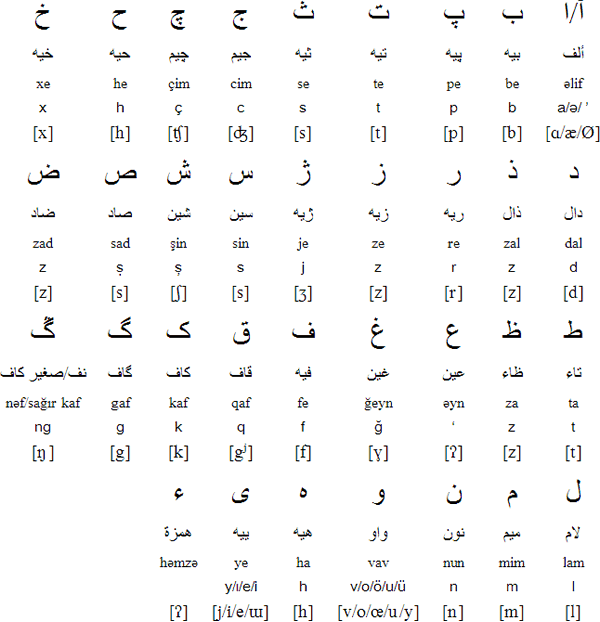Chagatai is an extinct Turkic language that was spoken in Central Asia, particularly in the Khorasan region. It was also spoken by the early Mughal rules of India. It was used as a shared literary language until the early 20th century.
The name Chagatai comes from the Chagatai Khanate (1225-1680s), which was established by Chagatai Khan, the second son of Genghis Khan.
Chagatai is a member of the Karkluk branch of Turkic languages and contains many loanwords from Arabic and Persian. It descended from Old Turkic, and its written form was based on Karakhanid and Khorezmian, two Middle Turkic literary languages.
In Uzbekistan, which was founded as the Soviet Republic of Uzbekistan in 1924, Chagatai is officially known as 'Old Uzbek'. In China it is sometimes called 'Ancient Uyghur'. Uzbek and Uyghur are indeed closely related to Chagatai.

Details of the Chagatai alphabet supplied by Michael Peter Füstumum
Download an alphabet chart for Chagatai (Excel)
Information about Chagatai | Numbers in Chagatai
Information about Chagatai
https://en.wikipedia.org/wiki/Chagatai_language
https://tr.wikipedia.org/wiki/Çağatayca
http://www.iranicaonline.org/articles/chaghatay-language-and-literature
https://www.britannica.com/art/Chagatai-literature
http://thediplomat.com/2016/02/the-weird-case-of-the-uzbek-language/
Altay, Äynu, Azerbaijani, Bashkir, Chagatai, Chelkan, Chulym, Chuvash, Crimean Tatar, Dolgan, Fuyu Kyrgyz, Gagauz, Ili Turki, Karachay-Balkar, Karaim, Karakalpak, Karamanli Turkish, Kazakh, Khakas, Khalaj, Khorasani Turkic, Krymchak, Kumandy, Kumyk, Kyrgyz, Lop, Nogai, Old Turkic, Qashqai, Romanian Tatar, Salar, Shor, Siberian Tatar, Soyot, Tatar, Teleut, Tofa, Turkish, Turkmen, Tuvan, Urum, Uyghur, Uzbek, Western Yugur, Yakut (Sakha)
Adamaua Fulfulde, Afrikaans, Arabic (Algerian), Arabic (Bedawi), Arabic (Chadian), Arabic (Egyptian), Arabic (Gulf), Arabic (Hassaniya), Arabic (Hejazi), Arabic (Lebanese), Arabic (Libyan), Arabic (Modern Standard), Arabic (Moroccan), Arabic (Najdi), Arabic (Sudanese), Arabic (Syrian), Arabic (Tunisian), Arwi, Äynu, Azeri, Balanta-Ganja, Balti, Baluchi, Beja, Belarusian, Bosnian, Brahui, Chagatai, Chechen, Chittagonian, Comorian, Crimean Tatar, Dargwa, Dari, Dhatki, Dogri, Domari, Gawar Bati, Gawri, Gilaki, Hausa, Hazaragi, Hindko, Indus Kohistani, Kabyle, Kalkoti, Karakalpak, Kashmiri, Kazakh, Khowar, Khorasani Turkic, Khwarezmian, Konkani, Kumzari, Kurdish, Kyrgyz, Lezgi, Lop, Luri, Maguindanao, Malay, Malay (Terengganu), Mandinka, Marwari, Mazandarani, Mogholi, Morisco, Mozarabic, Munji, Noakhailla, Nubi, Ormuri, Palula, Parkari Koli, Pashto, Persian/Farsi, Punjabi, Qashqai, Rajasthani, Rohingya, Salar, Saraiki, Sawi, Serer, Shabaki, Shina, Shughni, Sindhi, Somali, Soninke, Tatar, Tausūg, Tawallammat Tamajaq, Tayart Tamajeq, Ternate, Torwali, Turkish, Urdu, Uyghur, Uzbek, Wakhi, Wanetsi, Wolof, Xiao'erjing, Yidgha
[top]
You can support this site by Buying Me A Coffee, and if you like what you see on this page, you can use the buttons below to share it with people you know.

If you like this site and find it useful, you can support it by making a donation via PayPal or Patreon, or by contributing in other ways. Omniglot is how I make my living.
Note: all links on this site to Amazon.com, Amazon.co.uk
and Amazon.fr
are affiliate links. This means I earn a commission if you click on any of them and buy something. So by clicking on these links you can help to support this site.
[top]